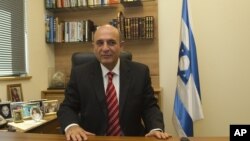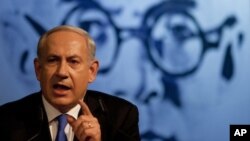Former Israeli opposition leader Shaul Mofaz's surprise entry into Israel's ruling coalition this week appears unlikely to trigger a major shift in Israeli policy on Iran's nuclear program, analysts say.
The leader of Israel's centrist Kadima party was sworn in as Israeli vice premier this week after agreeing to join Prime Minister Benjamin Netanyahu's nationalist coalition in a unity government. Israel's parliament, the Knesset, approved the unity deal between Mofaz's Kadima and Netanyahu's Likud party on Wednesday by a vote of 71 to 23.
This political move has given rise to speculation in Israel that Netanyahu might be positioning for a military strike against Iran, which Israel accuses of seeking to build nuclear weapons. Iran denies the charge and has vowed to retaliate if attacked.
Western powers have urged the Israeli government to hold off any attack on Iran in order to give stiff new sanctions a chance to bring Iran back to the negotiating table. A new round of talks on Iran's nuclear program is scheduled with world powers for later this month.
On Wednesday, Netanyahu told visiting European Union policy chief Catherine Ashton that Iran is stalling in the negotiations and demanded that Iran halt all uranium enrichment.
In announcing the new government, Netanyahu did not specifically mention Iran. And Kadima officials said Iran was not part of the negotiations that led to the new coalition.
But Mofaz, 63, a former Israeli military chief and defense minister, previously has joined Netanyahu and other Israeli leaders in warning that a nuclear-armed Iran would be a threat to Israel's existence.
A political science professor at Hebrew University, Abraham Diskin, said the new coalition will probably solidify support for any decision on Iran.
"Different people in the government, especially in the enlarged government, have probably different opinions," Diskin said. "But I also think that once a decision is reached, one way or the other, it's going to be supported more easily by the Knesset and probably also by the public."
In a Jerusalem Post interview last month, Iranian-born Mofaz said that "allowing Iran to obtain even a civilian nuclear capability would change the balance of power in the Middle East," adding that "Israel cannot accept this."
He also said that if Israel sees Iran "getting closer to a military nuclear capability" and the United States failing to stop such progress, he will be "the first to support Israel taking action" against Iranian nuclear sites.
Boosting Netanyahu's stance
In an interview with VOA, London-based Middle East expert Yossi Mekelberg of Chatham House said Mofaz's security credentials lend credibility to Netanyahu's tough Iran stance.
"Bringing Mofaz into the government [allows the prime minister to] say, 'here is another military man, [who] knows what should be done and knows what he is doing," said Mekelberg.
In another boost to Netanyahu, his expanded 94-seat coalition in the 120-member Knesset gives him a huge majority to support any possible confrontation with Iran.
But, Mofaz also told the Jerusalem Post that the Iranian "sword" is not yet on Israel's "neck," as he put it.
Timing uncertain
Natan Sachs, an Israeli politics expert at the Brookings Institution in Washington, told VOA that Mofaz has been "more cautious" than Netanyahu and Defense Minister Ehud Barak about the timing of action against Iran.
Netanyahu and Barak repeatedly have warned the international community that time is running out for negotiations and sanctions to pressure Iran to stop enriching uranium, a key nuclear weapon ingredient.
Last month, when Israel's former internal security chief Yuval Diskin accused the two men of exaggerating the perceived Iranian threat and the effectiveness of a military strike, Mofaz said he took those criticisms seriously.
Sachs said Mofaz, then opposition leader, made the comment partly to score political points against the government. He said Mofaz also sent a message of skepticism about the urgency of military action.
Another sign of Mofaz's caution on Iran is his recent contention that the Iranian nuclear program is not Israel's biggest threat.
In the Jerusalem Post interview, the Kadima leader said Israel faces a greater danger of losing its Jewish majority if it has to absorb millions of Palestinian Arabs who do not get a state of their own.
Both Sachs and Chatham House expert Mekelberg said the new Israeli vice premier's overall impact on the government's Iran strategy is hard to determine because of his reputation for changing positions on major issues.
One example is Mofaz's agreement to join a Netanyahu-led coalition two months after using his Facebook page to declare that he would not join what he called a "bad and failed" government.
Uncertainty over policy
An additional uncertainty in Mofaz's influence over Iran policy is his level of involvement in the decision-making process.
Under the Likud-Kadima agreement, Mofaz earns a position in an informal Israeli security cabinet that previously included eight senior members.
But Sachs said the Iran nuclear issue is so sensitive that just two members have been making most of the decisions: the prime minister and defense minister.
"It is too early to tell whether or not Mofaz will join the innermost circle of consultation between Mr. Netanyahu and Barak," Sachs said. "It very much depends on how Mr. Netanyahu views the partnership with Mofaz and how close he brings him into the discussions."
But the head of the PASSIA Palestinian think tank, Mahdi Abdul Hadi, says Israel is strengthening its military hand.
"I see the military generals, Mofaz, Barak and others, are joining ranks towards launching certain operations in the region in order to show the Israeli public some legitimacy of their authority as well as legitimacy for having such a coalition now," he said.
Ultimately, Hebrew University political analyst Peter Medding says, any decision to attack Iran is not likely to be made without the accord of Europe and the United States.
"The dangers of such activity are pretty clear," Medding said. "The chances of success are clouded to say the best. In broad terms it really makes no difference that Mofaz has gone into the Cabinet in terms of the major issues about Iran."
VOA's Bobb reported from Jerusalem and Lipin from Washington.








